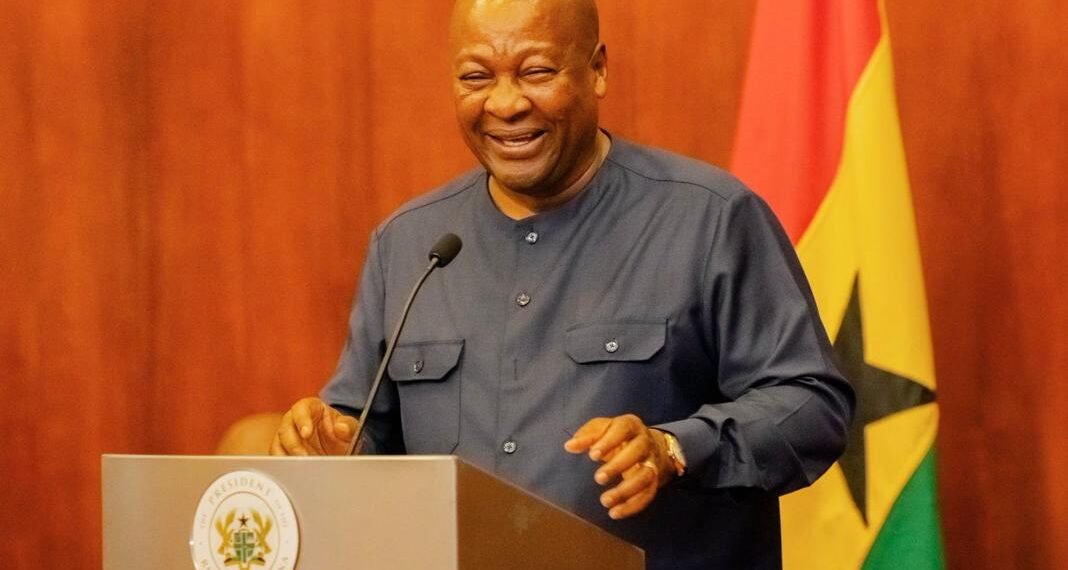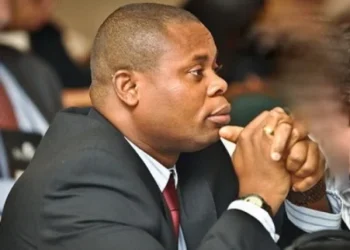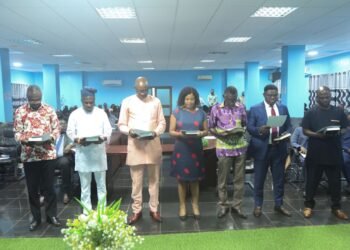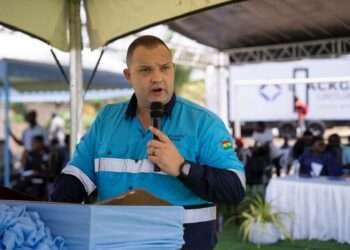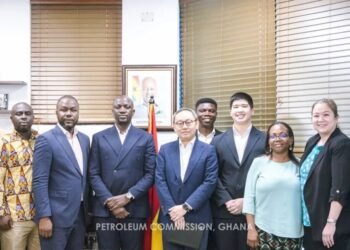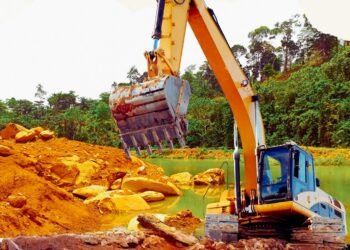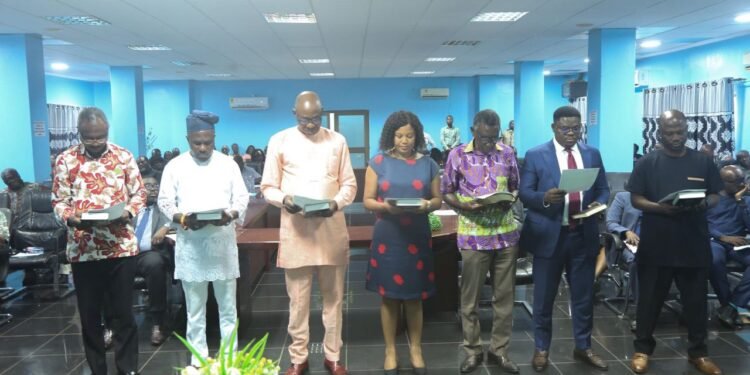In a high-level meeting at the Jubilee House with members of the Federation of Associations of Ghanaian Exporters (FAGE), President John Dramani Mahama affirmed his unwavering commitment to elevating Ghana’s export sector as the fulcrum of the nation’s 24-hour economic transformation agenda.
Describing the gathering as long overdue, President Mahama lauded exporters as the “first to Ghana’s economy,” emphasizing their critical role in bringing in foreign exchange and driving macroeconomic stability.
“Indeed, you are the first to Ghana’s economy – you are the ones who bring the dollars in, and so we have to give you pride of place in terms of facilitating your businesses.
“And so I’m happy that we’re meeting today as key partners in our being able to achieve our economic objectives under the 24-Hour Economic Policy.”
HE President John Dramani Mahama
In reinforcing this commitment, he revealed that the newly inaugurated Accelerated Export Development Advisory Committee—under his direct chairmanship—will ensure sustained, high-level dialogue between government and export stakeholders.
This, he said, will facilitate the swift resolution of structural bottlenecks and catalyze Ghana’s journey toward becoming a net exporter.
He provided context on the macroeconomic strides Ghana has made recently, referencing the March budget as a pivotal moment in reversing the economic downturn.
“The budget aimed to restore macroeconomic stability by moving from a negative primary balance of -3.9% to a projected surplus of 1.5% by year-end.”
HE President John Dramani Mahama
President Mahama touted the early signs of economic recovery, including the appreciation of the Ghanaian Cedi, shrinking deficits, and a revival in investor confidence, as evidence of prudent fiscal management in collaboration with the Minister of Finance and the Bank of Ghana.
However, the President also cautioned that while the Cedi’s strengthening against the US dollar is encouraging, balance must be maintained to protect the competitiveness of Ghanaian exports.
“With our A-level, economics, we all know that it’s a balance towards more expensive, and so there must be a fair balance to try and achieve the true value of the Cedi.
“Some people say, Oh, it will come down to four, but, of course, we know the true value of the Cedi is not four, and if it went as far down as four, it would kill all our export businesses”.
HE President John Dramani Mahama
Citing discussions with the Finance Minister and the Governor of the Bank of Ghana, President Mahama said that a band between GHS10 and GHS12 to the dollar would represent a fair value that supports both exporters and local producers, without encouraging a flood of cheap imports.
President Mahama was optimistic about how the improved macroeconomic environment could translate into real gains for exporters.
He noted that cheaper fuel, reduced port charges, and stable exchange rates could significantly lower the cost of doing business.
“Let’s produce more products that people demand outside so that we have a better balance in terms of economic growth,” he urged, emphasising the importance of producing locally rather than relying on imported goods like toothpicks and biscuits.
Practical Interventions
On practical interventions, President Mahama highlighted the need to improve export processes, provide pack houses for proper packaging, and offer affordable credit through the Ghana Exim Bank.
He acknowledged past failures in credit disbursement and pledged to refocus financial support toward genuine exporters. “If you look at the list of some of those who took that money, you wonder,” he said, expressing disapproval over the misuse of Exim Bank funds for non-productive ventures.
To achieve global competitiveness, the President emphasized the need to strengthen regulatory institutions like the Ghana Standards Authority and the Food and Drugs Authority to ensure Ghanaian goods meet international standards.
Applauding the sector’s recent performance, he celebrated the achievement of $3.6 billion in non-traditional exports and endorsed FAGE’s ambition to reach $5 billion by 2027 and $10 billion by 2030.
“That will be fantastic, and we’ll start working together from today to make sure that we meet those targets.”
HE President John Dramani Mahama
President Mahama also discussed leveraging the African Continental Free Trade Area (AfCFTA) to boost intra-African trade. He attributed Africa’s historically low intra-continental trade levels to colonial legacies and poor infrastructure designed to serve European rather than African markets.
Highlighting new port developments under Meridian Port Services (MPS), he noted that Ghana is well-positioned to become a logistics hub for the West African sub-region, enabling better distribution of goods to countries like Liberia, Sierra Leone, Namibia, and Cameroon.
The President stressed Ghana’s geographical advantage as the country closest to the intersection of the equator and the Greenwich Meridian.
“Ghana is the country closest to the middle of the world where longitude and latitude meet, it means there’s offshore Tema. And so our distance in terms of every part of the world is much, of an advantage than other people who are in the Far East or other people who are in the Far West.
“And so it means that it’s something we can take advantage of if we pack our produce within six hours, we can have it in the European markets, within eight hours, we can have it in the Middle Eastern markets and within nine hours, we can have it in the American markets.”
HE President John Dramani Mahama
President Mahama encouraged exporters to seize this strategic positioning, calling it a blessing not all countries have.
The Volta Lake Economic Zone
In outlining infrastructural expansion under the 24-hour economy policy, President Mahama unveiled plans for the Volta Lake Economic Zone, a transformational agribusiness hub envisioned as a legacy project tied to Ghana’s historical development agenda.
He explained that the project will include road and energy infrastructure, an inland port, and a rail line from Tema to Mpakadan, all designed to enhance export logistics for products like pineapples, mangoes, and peppers.
“We are doing the design and the planning, and when the time comes, we’ll invite you so that we cut sod for the beginning of the Volta Lake Economic Zone Project”, he remarked.
The long-term goal, President Mahama emphasised, is to create sustainable jobs and economic opportunities for Ghana’s youth.
“If we support you and expand your businesses, we’ll be able to create hundreds of thousands of jobs so that our young people don’t have to take the risky journey across the desert and Mediterranean to reach Europe”.
HE President John Dramani Mahama
The President expressed strong support for the development of the Pan-African Payment and Settlement System (PAPSS) under AfCFTA, which he said would revolutionize trade by eliminating the need to use foreign currencies in intra-African transactions.
He also responded positively to complaints about the exclusion of FAGE from critical institutional boards like GEPA and Exim Bank. “That’s a sad mistake. How can FAGE not be on the GEPA board?” he questioned, pledging to rectify what he described as an oversight.
In a personal touch, President Mahama revealed his involvement in the agricultural sector, disclosing that he operates a maize and soya bean farm, along with livestock and cocoa production. “So you can be sure that in November, I’ll put it in my diary and make sure I’ll honour the Ghana Horticulture Expo scheduled for November 6, 2025,” he assured.
A larger vision for Ghana’s economic sovereignty, based on value-added exports, macroeconomic discipline, and African self-reliance, was echoed in President Mahama’s speech as the meeting came to an end.
His appeal for collaboration, institutional change, and infrastructure spending served as a rallying call and a road map for exporters looking to capitalise on Ghana’s new economic era.
READ ALSO: Ghana Secures ¥402 Million Japanese Grant for Human Development

